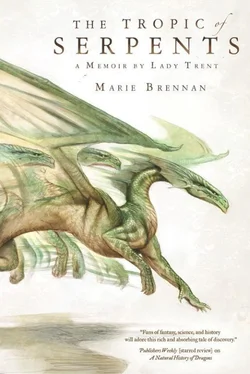Yeyuama’s distraction had served its purpose, with pefect timing. A boy came running up just then, summoning the four of us once more back to camp.
The other pure were drawn into conversation briefly after we returned, while I waited apart. Then I was beckoned over, and Rikwilene delivered their answer. “You speak wisdom on some things,” the old woman said, “and foolishness on others. We will not attack the Ikwunde.”
My heart sank. All that hope… but this was too much to ask of them, and the possible reward too uncertain.
“Our hunters can be hunters of men when there is no other choice, but what you ask—for us to stop their camps so directly—that would only result in death on both sides. But, ” Rikwilene said, and my breath stopped, “we have agreed to try other ways.”
On the instant, my imagination filled with new possibilities, each one madder than the last. The hunter Lumemouwin stopped me, though, with a cautionary hand. “You do not know the forest, or our people. Not well enough. We will be the ones to make these plans.”
He was right. I was no tactician, nor was I Moulish; I did not know how they might be most effective. What I had to offer was information, and assistance with the world outside when this matter ended. “If it would be useful,” I said, “I can tell you things about Point Miriam, and the weapons the people on both sides carry.”
Yeyuama laughed. As tense as I was, it shocked me that he could be so cheerful. “We will have to think how to translate that for the drums, but yes. And you can do more than that. You are one of the pure now.”
As pure as a hut full of foul smoke could make me. “Yes,” I said. “The promise I made—”
“Not that,” Yeyuama said, grinning. “Come. This, too, is only for a few ears.”
* * *
The ears in question were those of the pure: those who had qualified themselves to “touch the dragons.”
That category, you may note, does not include your ears, nor your eyes neither. (Unless you have undergone that test yourself and passed, in which case you will not need me to tell you what I am about to omit.) As before, I will speak only of those things which I believe are safe to be shared with others, based on the judgment of my more experienced Moulish counterparts. I may have gone to the island and returned, but that was only the barest part of what it meant to join their ranks.
“If we move the eggs now,” Yeyuama said when we had drawn apart, “they will hatch early. And then they may feast upon those who come into their waters.”
I received these words in wide-eyed silence. He spoke the way my parents’ housekeeper in Tamshire might, suggesting that it would be advisable to shift the winter shutters into position a few weeks early. As if “moving the eggs” were a common task—just one not usually done at this time.
While the other fellows considered it, Yeyuama explained to me. And this, suitably edited, is what I learned.
The dragons I had seen in the lake were, as I have said, queen dragons, the females of a species for which I had heretofore only seen the males. Now I learned that the chief task of the pure was first to bring suitable males up to the lake for breeding, and then to disperse the eggs after they were laid, to various points around the swamp.
The ramifications of this have been laid out extensively in my more academic works; I will dwell on only one now, as many of you are no doubt anxious to leave the dusty byways of natural history and get back to the invading army. The eggs so distributed were not, as is common among other draconic breeds, large and few in number. They were myriad, and shockingly small: less than ten centimeters in length. I thought of swamp-wyrms and their usual habits, and asked Yeyuama how on earth newly hatched dragons could be of much use in stopping an army, however many of them there might be.
He grinned from ear to ear, as delighted as a magician pulling back the curtain to reveal his great trick. “You have seen them, and feared them. But you have called them fangfish.”
The tiny, eel-like predator that had taken a bite out of my left arm back in Floris; the entirely aquatic creature we had thought at best to be a draconic cousin. In reality it was the infantile form of the great swamp-wyrm. They hatched in abundance, and were eaten in abundance not only by snakes and other creatures, but by their own, more mature kind; those who survived grew and changed, eventually becoming the full-grown dragons to which we had devoted the bulk of our attention and study.
(Despite the unsightly scar on my arm, there was a part of me that thought in delight: I’ve been bitten by a dragon !)
Then I remembered the swarms of fangfish that had roiled the waters during the flood, the avoidance of which had spurred the construction of tree-bridges. If the Ikwunde attempted to wade through on their way to Point Miriam—and they could hardly avoid it—then the consequences would be very bloody indeed.
“You will help,” Yeyuama said, still grinning. “Your way of going to and from the island was madness; I have never seen anything like it. Most of us go a much easier way! We should call you Sasoumin instead.”
Sasoumin—“woman who flies.”
Yeyuama went on while I was considering my new appellation and fighting the urge to giggle with delight. (Even now, I believe that is the name by which I am best known in the swamps of Mouleen. It is much more flattering than some of the sobriquets I have born in the news-sheets of Scirland.) “I will show you where the eggs are, and you will help move them; that is your work now. We will use the drums to tell others to do the same.”
I will, of course, not tell you where the eggs are initially laid, save to say that they are not on the island; the purpose of that challenge is to give a view of the queen dragons, and to test the mettle of those who will henceforth be taking their unhatched offspring from their original place of laying to new locations deeper in the swamp. This stage of the process I did not do, for it was not the correct season for newly laid eggs. Although the experience sounds hair-raising—queen dragons are decidedly unfriendly—it is one of my great regrets that I never had the chance, for my time in Mouleen was drawing to an end, and I have never been able to return for more than a few days. To come so close to one of the queens… I have had other breathtaking experiences in my life, some of which (others would say) surpass even that one. But one does not cease to treasure a gem simply because one owns another that is larger. I would have loved to place that in the jewelry box of my memory.
I did, however, go with Yeyuama to where the current clutches of eggs were buried, in soft swamp muck. This is where they do much of their incubation, before being shifted to the water for hatching. The history of how this process developed has been discussed at greater length by the Yembe historian Chinaka n Oforiro Dara; I advise those interested in such matters to read her work, and to consult my own monographs for analysis of its effect on draconic development.
But enough of such matters: there is an invading army to attend to.
Drums had passed the requisite messages through the Green Hell, faster than any messenger could carry them. The four of us (myself, Yeyuama, and our two companions) were not the only ones shifting eggs; indeed, ours were likely to be the least relevant, for the Ikwunde were almost certain to make their crossing farther to the east. To hatch only some of the dragons now would, however, disturb the balance of the swamp. As it was, Yeyuama admitted that the effects of this would be difficult, as it was not the season of flooding, when food would be most abundant. “I hope they get a good meal off the Ikwunde, then,” I said.
Читать дальше












